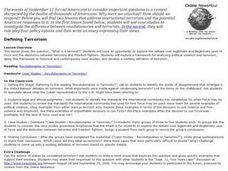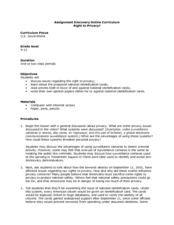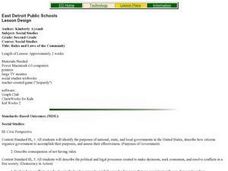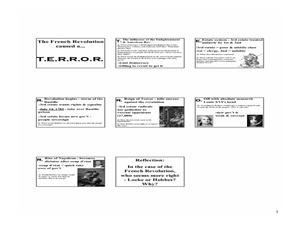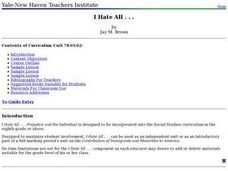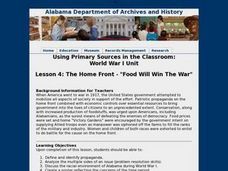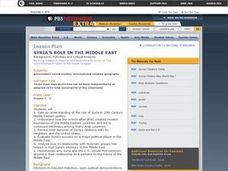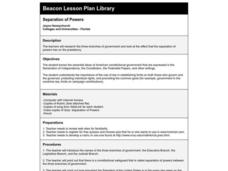Curated OER
Defining Terrorism
Students explore the debate over legitimate and illegitimate uses of force and differentiate between terrorists and freedom fighters. They read articles, participate in class discussion and write an essay with their observations.
Curated OER
Statue of Liberty: A Famous Gift
In this Statue of Liberty worksheet, students read a passage, then answer 5 multiple choice questions; answers included on page 2.
Curated OER
Assignment Discovery Online Curriculum Right to Privacy?
Young scholars explore privacy rights. In this civics lesson, students investigate the pros and cons of proposed national identification cards as they explore provided Internet links. Young scholars write position papers pertaining to...
Curated OER
Indian Removal: The Cherokees, Jackson, and the “Trail of Tears”
Students examine executive power. In this Indian Removal lesson, students listen to their instructor present a lecture regarding the "Trail of Tears". Students respond to discussion questions regarding the lecture.
Curated OER
Press Freedom Versus Military Censorship
Eleventh graders explore the term terrorism. In this US History lesson plan, 11th graders participate in a press release on terrorism.
Curated OER
War and the Media Press Freedom vs. Military Censorship
Students analyze the relationship between war and media. In this media awareness instructional activity, students listen to their instructor present a lecture on freedom of the press and military censorship. Students participate in an...
Curated OER
Rules and Laws of the Community
Second graders recognize and identify the need for rules in school. They also discuss the importance of safety rules at school, home, and in the community. They illustrate a rule which they have learned in class, and write letters to the...
Curated OER
Benjamin Franklin: Colonial Printer and Journalist
Fifth graders explore how important print media is to everyone's daily life. Students use present daily newspapers and they are to reproduce weather forecasts.
Curated OER
Poland's Next Step
Students investigate the history of Poland. They explore various Polish historical websites, explore an interactive online map of Polish cities, answer discussion questions, and locate newspaper articles about Poland.
Curated OER
Government: The Power of Persuasion
Students are able to define and identify a type of interest group. They are able to describe some strategies used by interest group. Students are able to identify the postive and negative aspects of interest groups.
Curated OER
Vote for Me!
Tenth graders analyze voter trends in South Carolina and discover techniques canddidates and their parties use to convince us to vote their way. They are able to locate voting statistics for their county; compare the number of...
Curated OER
Events Leading to the War of 1812
For this US History worksheet, students read a selection of the War of 1812 and fill in the blanks for 10 sentences using a word bank.
Curated OER
The French Revolution caused a... T.E.R.R.O.R.
In this French Revolution study guide worksheet, young scholars read a brief overview pertaining to the time period in French history and then respond to 10 reflection questions.
Curated OER
You Either Know it or You Don't 5
In this Internet research skills worksheet, students respond to 15 short answer trivia questions. Students may use reference sources if they don't know the answers.
Curated OER
How Women Won the Right to Vote
Students consider how women gained the right to vote in America. In this suffrage lesson, students investigate major events of the suffrage movement and conduct research. Students also role play petitioning to President Wilson to...
Curated OER
Inspiration for and Application of the Bill of Rights
Learners examine individual rights. In this case law lesson plan, students discuss the from and function of the Bill of Rights prior to investigating several cases that deal with Constitutional rights. Learners discuss the outcome of the...
Curated OER
Executive Branch & Presidents Questions
For this U. S. government worksheet, students respond to 20 short answer questions about the responsibilities of the executive branch and the president.
Curated OER
The Cold War and Development of Post-War America
Young scholars view examples of political advertisements during the years of 1952 through 1964. After viewing, they discuss how the Cold War and the threat of Communism affected the development of the United States. They compare the Cold...
Curated OER
I Hate All . . .
Students examine the concept of prejudice of human beings towards other human beings. They define prejudice and analyze the history of the word, read a U.N. Commission Report on prejudice, and examine textbooks for prejudice.
Curated OER
United States Entry into World War I: Some Hypotheses About U.S. Entry
Students take a stand on a hypothesis for U.S. entry into World War I, supported by specific evidence.
Curated OER
The Home Front - "Food Will Win The War"
Pupils define and identify propaganda. They analyze the multiple sides of an issue (problem resolution skills), then discuss the racial environment of Alabama during World War I. They reate a poster reflecting the concerns of the time...
Curated OER
The Free Trade Conundrum: Balancing Worker Wages and Consumer Prices Comparing the 19th and 21st Centuries
Exploring the concepts of free trade and protectionism, pupils compare and contrast 19th and 21st century arguments for and against the tariff.
Curated OER
Syria's Role in the Middle East
Students hypothesize why Syria and the U.S. should find common ground in their relationship as it pertains to the future of the Middle East.
Curated OER
Separation of Powers
Eighth graders research the three branches of government and examine the effect that the separation of powers has on the presidency. They explain the importance of the rule of law in establishing limits on both those who govern and the...
Other popular searches
- Roots of American Democracy
- Basis of American Democracy
- Origins American Democracy
- Early American Democracy
- Native American Democracy
- Analyze American Democracy


